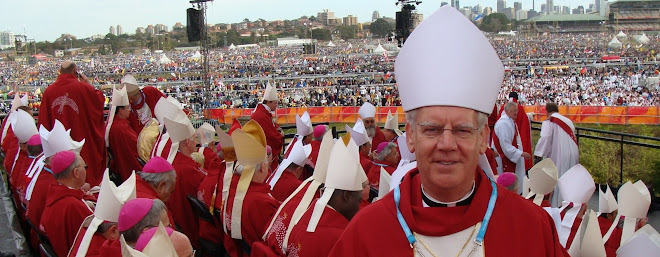 It is called the Rite of Election because it is God who has chosen these people to be part of God's holy people, and it is in God's name that the Church acts.
It is called the Rite of Election because it is God who has chosen these people to be part of God's holy people, and it is in God's name that the Church acts. The Bishop questions the Godparents to hear their recommendation: "As God is your witness, do you consider these candidates worthy to be admitted to the sacraments of Christian initiation?
The Bishop questions the Godparents to hear their recommendation: "As God is your witness, do you consider these candidates worthy to be admitted to the sacraments of Christian initiation? The catechumens express their wish to enter fully into the life of the Church through the sacraments of baptism, confirmation, and the eucharist. They then enter their names into the Book of the Elect.
The catechumens express their wish to enter fully into the life of the Church through the sacraments of baptism, confirmation, and the eucharist. They then enter their names into the Book of the Elect.
The dignity of this celebration is much contributed to by the excellent servers at the Cathedral.
 The Bishop then says: "I now delcare you to be members of the elect, to be initiated into the sacred mysteries at the next Easter Vigil.
The Bishop then says: "I now delcare you to be members of the elect, to be initiated into the sacred mysteries at the next Easter Vigil. "That these elect may find joy in daily prayer, we pray: Lord hear our prayer.
"That these elect may find joy in daily prayer, we pray: Lord hear our prayer. That these elect may read your word and joyfully dwell on it in their hearts, we pray.
That these elect may read your word and joyfully dwell on it in their hearts, we pray.
That each day of Lent they may do something in your honour, we pray.
 That they may grow to love and seek virtue and holiness of life, we pray.
That they may grow to love and seek virtue and holiness of life, we pray. That they may dedicate their daily work as a pleasing offering to you, we pray.
That they may dedicate their daily work as a pleasing offering to you, we pray. That you will bless and protect their families, we pray.
That you will bless and protect their families, we pray. Father, guide the elect of your Church and strengthen them in their vocation, we pray.
Father, guide the elect of your Church and strengthen them in their vocation, we pray. Dear elect, you have set out with us on the road that leads to the glory of Easter. Christ will be your way, your truth, and your life.
Dear elect, you have set out with us on the road that leads to the glory of Easter. Christ will be your way, your truth, and your life. These elect now become the heart of our Lent as they journey towards baptism and with them we journey to a renewed commitment to our own baptismal calling at Easter.
These elect now become the heart of our Lent as they journey towards baptism and with them we journey to a renewed commitment to our own baptismal calling at Easter.Amen.
-30-



















 In 2007 Sr. Eva was hired to co-ordinate a thirteen month pilot project "Interculturation of Faith" in the dioceses of Western Canada. Here is Sr. Eva with a pretty happy group at Telegraph Creek.
In 2007 Sr. Eva was hired to co-ordinate a thirteen month pilot project "Interculturation of Faith" in the dioceses of Western Canada. Here is Sr. Eva with a pretty happy group at Telegraph Creek. And Sr. Eva speaking with a group at Fort McMurray.
And Sr. Eva speaking with a group at Fort McMurray.




